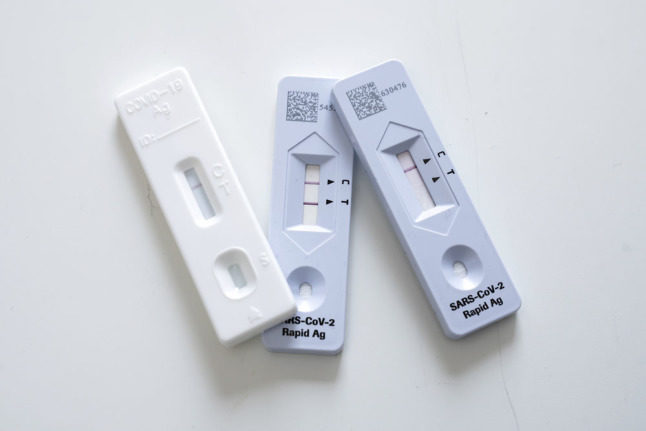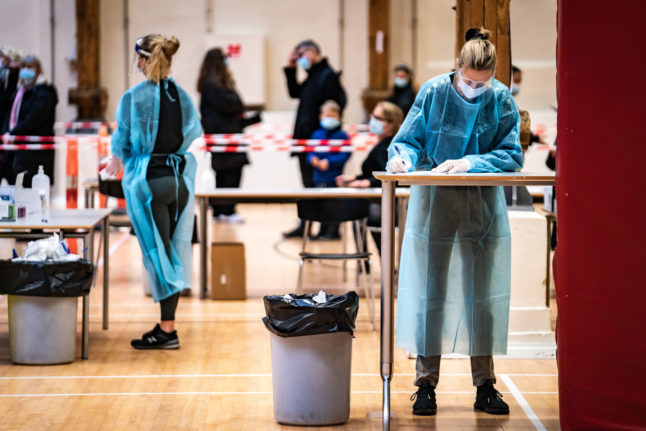A study conducted by researchers across the major Danish hospitals, universities, and government agencies (including the State Serum Institute, Denmark’s infectious disease agency) examined the sensitivity of 46 rapid tests produced by 23 manufacturers. Some tests failed miserably, detecting only about 3 percent of positive cases, while others detected over 90 percent.
Why so many brands of rapid tests in Denmark?
While the United States only gave emergency use authorisation to three manufacturers of Covid self-tests (Ellume Limited, Abbot Diagnostics and the Quidel Corporation), the Danish government took a different tact. In Denmark, at-home Covid tests only need instructions written in Danish, a clear and easy-to-read result, and the CE mark—a label that indicates the manufacturer believes its product meets European Union standards for health and safety.
However, there are no independently-verified guarantees about the tests’ accuracy, and that’s led to a market swamped with defective products.
The study, which is currently undergoing peer review for publication in the Journal of Clinical Virology, has spurred Danish politicians to demand more oversight of rapid tests.
Independent member of parliament Liselott Blixt, the former health spokesperson for the Danish People’s Party, has suggested that tests with less than 50 percent sensitivity be removed from the market, broadcaster DR reported.
Blixt said that as a major purchaser of quick tests, it’s high time the government examined the quality of the tests.
“This could be money out the window,” she told DR. “We spend millions on these tests, including for schools, so of course we need to know how they work.”
Peder Hvelplund, health spokesperson for the left-wing Red Green Alliance (Enhedslisten), agrees that more regulation is necessary.
“It is crucial that we get a national control of it so that it is not up to the market, and so it is not consumers who are left in the lurch,” he told DR.
Winners of the study
To determine the real-world accuracy of each rapid test, the researchers tested 200 volunteers who had received a positive PCR result in the previous 72 hours, as well as 200 volunteers who were believed to be Covid-free as a control. Researchers followed the sampling instructions provided by the manufacturers for each of the 46 tests, for a total of about 3,800 test subjects (each participant used multiple tests).
The researchers concluded that the top 17 rapid antigen tests included in the study were significantly better than the bottom 29. But since most of the tests the study analysed are intended for professional use and can’t be purchased by members of the public, here’s a shortlist of what you can actually buy.
- Flowflex SARS-CoV-2 Antigen Rapid Tests, produced by ACON
- The study indicates that that Flowflex detects about 94 percent of positive Covid cases.
- We found the Flowflex test available at med24.dk (125 kroner for a 5 pack) and Dollarstore.dk (25 kroner per test).
- COVID-19 Antigen Detection Kit, by DNA Diagnostics
- According to the study, the DNA Diagnostics kit detects about 91 percent of positive Covid cases.
- DNA Diagnostics’ official distributor in Denmark is tepotesten.dk. As of writing, you can get a pack of 20 tests for 320 kroner.
A self-test by Chinese manufacturer Wondfo also scored above 90 percent sensitivity, but it’s unclear where they’re available for sale in Denmark.
What tests to avoid?
The worst-performing self-test in the study was Wantai’s SARS-CoV-2 Ag Rapid Test (Colloidal Gold) when used with saliva samples. The study authors concluded that nasal samples, rather than throat or saliva samples, can more reliably detect Covid-19.
What about the home-tests sold at Matas, Normal and my neighbourhood apotek (pharmacy)?
There were a handful of notable omissions from the list of self-tests included in the study, including Newgene Bioengineering’s COVID-19 Antigen Detection Kit and Boson Biotech’s Rapid SARS-CoV-2 Antigen Test Card—if you’ve snagged tests from Matas, Normal or your local apotek, they’re likely Newgene or Boson.
Uffe Vest Schnieder, a researcher at the Copenhagen University Hopsital Hvidovre’s Department of Clinical Microbiology and the study’s lead author, did not immediately respond to a comment request from The Local as to why two of the most readily available self-tests in Denmark weren’t included in the study.
Last year, Danish pharmacology news outlet Dagens Pharma reported that manufacturers included in the study were asked to contribute 400 tests and 150,000 kroner to offset the cost of health professionals visiting participant’s homes to conduct the tests. That’s the equivalent of about $22,838.
It’s unclear if contributions were collected per test included (with a total of 46 tests in the study, that would amount to 6.9 million kroner) or per manufacturer (with 23 manufacturers, that would be 3.5 million kroner). Boson Biotech did not immediately respond to inquiries from The Local Denmark about whether they had been invited to participate in the study.



 Please whitelist us to continue reading.
Please whitelist us to continue reading.
Member comments